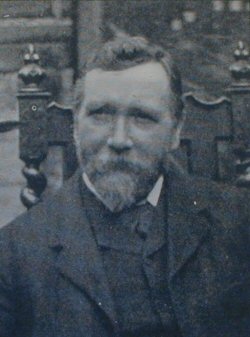 DAVID
CALDWELL McVAIL
DAVID
CALDWELL McVAILDESCENDED of Ayrshire stock on the father's side, and Wigtownshire on the mother's, Dr. McVail was born in Kilmarnock in October, 1845. He was schooled there, first by William Gunnion, stickit minister, but admirable classical scholar, and author of a well-known classical anthology, and afterwards by Donald Ferguson, latterly one of the famous teachers of Kilmarnock Academy. It was the time of the great Morisonian controversy - one of the earliest breaks from a too rigid Calvinism - and as his mother was an adherent of Morison in the United Secession congregation of Clark's Lane Chapel, the boy was brought up in the heart of the fiery discussion.
With a view to the profession of medicine he studied first at the old Andersonian College in Glasgow, where among his teachers were the late Sir George Macleod, George Buchanan, J. B. Cowan, and the brilliant chemistry lecturer, Penney. Thence he passed to Glasgow University, where he found himself under several of the same professors.
Before beginning practice he went as house surgeon to Alnwick Infirmary. There his most intimate friend was George Tate, F.G.S., the famous secretary of the Berwickshire Naturalist Club, and historian of Alnwick. It was the time when Joseph Cowan, proprietor of the Newcastle Chronicle, was the great Liberal light in the North of England; and Dr. McVail married in 1877 the daughter of Mr. T. N. Brown, the political leader-writer on the paper. In the same year he was admitted a Fellow of the Faculty of Physicians and Surgeons of Glasgow.
Returning to Glasgow he succeeded Eben Watson as Professor of Physiology in the Andersonian College, and held the position for four years, when he left in 1880 to help, along with Knox and Reid, in founding the Western Medical School. There he held the lectureship in Practice of Medicine, and at the same time became Dispensary Physician to the Western Infirmary.
Meanwhile the Faculty had instituted an annual lectureship, giving fifty guineas each year for three lectures on original work. The lecturer in the first year was Professor McKendrick, in the second year Sir Benjamin Ward Richardson, and in the third year, 1882, Dr. M'Vail. His lectures on "The Mechanism of Respiration," were partly printed in the Lancet.
On the opening of St. Mungo's College in 1889, Dr. McVail, who was one of the founders, became Professor of Clinical Medicine in that institution, and at the same time physician to the Royal Infirmary. These positions he continued to hold till 1905, when he retired on the age limit. Meanwhile, among other positions of trust, he had been appointed Crown member for Scotland upon the General Medical Council, and has been reappointed at each five-yearly period ever since.
Not his least notable work, however, has been the part he has taken in the cause of University reform. Along with the late W. R. Herkless, LL.B., he brought into existence the Glasgow University Council Association, which, first with Mr. Cochrane-Patrick and afterwards with Mr. J. G. A. Baird as president, soon had a thousand members. Its objects were -
To institute an entrance examination of high standard, so that the Professors might be relieved from secondary school work, and be enabled to begin their courses of instruction on a level at least as high as at the best colleges in Oxford or Cambridge.
To enlarge the University Courts, and make them more widely representative.
To transfer the whole property and executive power from the Senates to the enlarged Courts.
To give to the Courts the power of greatly enlarging the teaching staff of the Universities by new lecturers, extramural teachers, and otherwise.
To enlarge the powers of the General Councils, and to greatly augment their representation on the Courts.
To enable the students to form Representative Councils.
To institute new degrees and new faculties when required, and to form new Boards of Studies.
To admit women to University teaching and graduation equally with men.
After five years of strenuous exertion the Act of 1889 was procured, embodying all these proposals, and revolutionizing the whole University life of Scotland. Since then, and as a direct result, five new chairs and more than thirty lectureships have been set up, and the new Court has found and expended some £200,000 in erecting buildings for the Practical Science Department. The standard of teaching also has been immensely raised, the entrance examination in arts and Science being more than equivalent to the former M.A. degree.
At the first election of the University Court in 1889, the late Sheriffs Guthrie and Vary Campbell, and Dr. McVail, as candidates on the side of reform, were the subjects of much adverse canvassing, and were kept out. Two years later, however, along with Dr. King of Kilpatrick, Dr. McVail was again a candidate, and was returned, and ever since he has taken a most active interest in the business, having been reappointed without a contest every four years.
In the purely professional arena Dr. McVail has read, on points of valuable original research in respiratory, cardiac, and renal work, before the British Medical Association and other learned societies, many papers which are printed in the various medical journals.
By way of recreation, during a number of years, he spent his leisure in going over the cathedrals of England. He has a taste, also, for a good game of whist, which dates from his Alnwick days. He has a son in the medical profession, and a daughter married to Mr. John McIntyre, of the firm of Laird & McIntyre, writers.